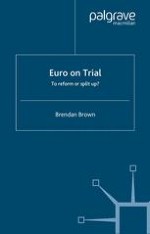2004 | Buch
Über dieses Buch
Euro on Trial looks back - to the aspirations of the founders - and forward - to the possibility of reform or splitting up. After five years of experience with the new currency, new insights are possible into the old arguments for and against union. Monetary union is reversible in part or in whole and this book assesses the costs and benefits.
Anzeige
